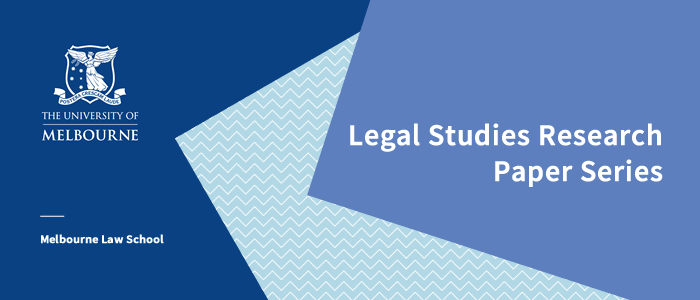Volume 22. No. 6
Wednesday, 5 August 2020

Melbourne Law School published Volume 22 Number 6 of the University of Melbourne Law School Legal Studies Research Paper Series on SSRN.
This issue includes the following articles:
Jeannie Paterson
Regulating Consumer Contracts in ASEAN: Variation and Change (893)
The ASEAN Economic Blueprint 2025 affirms the role of consumer protection as 'an integral part of a modern, efficient, effective and fair market place'. It further recognises that, particularly with the rise of e-commerce, a well-functioning consumer protection regime 'will require comprehensive and well-functioning national and regional consumer protection systems enforced through effective legislation, redress mechanisms and public awareness'.
Tarunabh Khaitan and Jane Calderwood Norton
The Right to Freedom of Religion and the Right Against Religious Discrimination:
Theoretical Distinctions (894)
This article argues that while they are often conflated, the right to freedom of religion and the right against religious discrimination are in fact distinct human rights. Religious freedom is best understood as protecting our interest in religious adherence (and non-adherence), understood from the committed perspective of the (non)adherent. This internal, committed, perspective generates a capacious and realistic conception of religious adherence, which reflects the staggering plurality of forms of religiosity (or lack thereof) as extant in contemporary societies. The right against religious discrimination is best understood as protecting our non-committal interest in the unsaddled membership of our religious group. Thus understood, the two rights have distinct normative rationales. Religious freedom is justified by the need to respect our decisional autonomy in matters of religious adherence. The prohibition on religious discrimination is justified by the need to reduce any significant (political, sociocultural, or material) advantage gaps between different religious groups. These differences reveal a complex map of two overlapping, but conceptually distinct, human rights which are not necessarily breached simultaneously.
William Partlett
Constitutional Historiography (896)
This paper will argue that the insights of professional historians can and should be used to better understand the use of history in constitutional argument. Historiography—the methodology of professional historians—demonstrates that history is frequently used selectively to advance a favored outcome. Judges and constitutional scholars should therefore be highly critical of claims that history provides objective answers to constitutional questions. At the same time, historiography shows that non-selective accounts of history can and should play an important role in finding answers to contemporary constitutional questions. In this role, history is under-determined and best used to support or shed new light on a constitutional argument. Historiography therefore demonstrates not just the perils of historical argument but also its possibilities for constitutional argument.
Julian Webb
Legal Technology: The Great Disruption (897)
This paper considers how legal technology, defined here as the use of digital information and communication technologies to automate or part automate legal work process, to provide decision support to legal service providers, and to provide legal information and advice directly to clients/end users, is re-shaping both legal work processes, and the organisation and governance of legal practice. Starting from an essentially descriptive and functional account of legal technology, the paper explores its role in changing the temporal-spatial and organisational characteristics of practice, and in creating new challenges for the regulation of legal services. The paper then moves explicitly into sociological theory to address the question how new legal technologies are reshaping the landscape of professional knowledge and expertise itself. It concludes by drawing together implications of these various strands for the future sustainability and legitimacy of the legal profession in its present form.
Michael Kobetsky
The Transfer-Pricing Profit-Split Method After BEPS: Back to the Future (898)
In 2018, the Organisation for Economic Co-operation and Development/Group of Twenty (OECD/G20) Inclusive Framework on base erosion and profit shifting (BEPS): action 10 issued revised guidance on the transactional profit-split method. Regrettably, the revised guidance failed to provide the opportunity for the profit-split method to be more often the most appropriate transfer-pricing method. The revised guidance expressly states that the lack of comparable uncontrolled transactions, by itself, is not a basis for the use of the profit-split method. Under the former guidance, the profit-split method was used infrequently. In the revised guidance, the threshold requirements for the use of the profit-split method are still restrictive. Consequently, it is likely that the profit-split method will rarely be the most appropriate transfer-pricing method. Nevertheless, the residual profit-split method is being considered for BEPS action 1, on the taxation of the digital economy. Two of the proposals under pillar 1 of the Inclusive Framework's 2019 short policy note involve the use of the residual profit-split method to allocate profits. These proposals involve new profit allocation rules that go beyond the arm's-length principle.